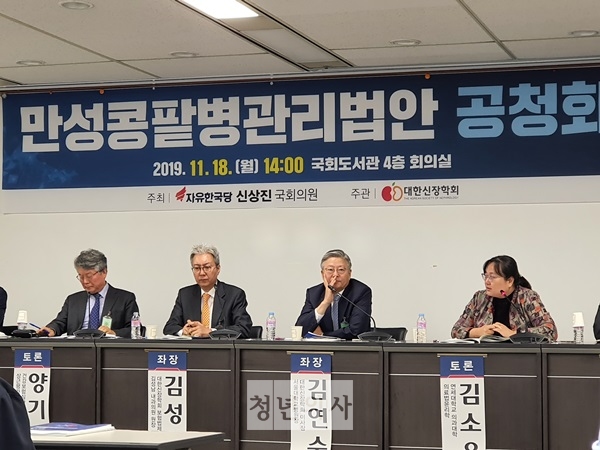A lawmaker and physicians have voiced for enacting new legislation to contain the increasing number of patients with chronic kidney disease (CKD).
Despite CKD’s high prevalence and incidence, complications and rising medical costs, the government provides no system for the prevention and management of the disease, experts said. Consequently, patients with CKD also suffer from financial difficulties, they said.

Rep. Shin Sang-jin of the main opposition Liberty Korea Party proposed a bill on Nov. 7 to establish a legal basis for systematic prevention and management of CKD and to establish an efficient management system. He also held a public hearing on the tentatively named “Chronic Kidney Disease Management Act” at the National Assembly on Monday.
The proposed bill aims to establish a comprehensive plan for CKD management every five years, organize a management committee under the Ministry of Health and Welfare to conduct research and statistics projects, support medical expenses for the disease, and provide a national certification system for artificial kidney facilities.
The Korean Society of Nephrology, which participated in the public hearing, said one in nine Korean adults suffered from kidney disease. The number of end-stage renal failure patients requiring dialysis or transplantation went up, and over 80,000 patients had dialysis treatment in 2018. Consequently, the medical costs surpassed 2 trillion won ($1.7 billion) per year, KSN said.
Because end-stage renal failure is severe, patients need professional medical staff and appropriate medical institutions to receive proper treatment. However, there are no laws on permits to open dialysis facilities or safety measures, which inflicts serious damage to patients, KSN added.
Lee Young-ki, director of the dialysis at KSN, said as the dialysis facility business is open to everyone including foundations, welfare corporations, cooperatives, and hospitals’ general managers, medical mishaps were occurring – such as hepatitis C infections in patients who used an artificial kidney facility in Daejeon and a urinary encephalopathy case in dialysis patients in a nursing hospital.
In 2015, 49 (6.6 percent) of the total 741 medical institutions received the lowest rating in hemodialysis adequacy, Lee said.
Thus, the government should manage the quality of dialysis facilities and support medical costs for patients through a national program for CKD, Lee argued.
He emphasized the need for a new law to identify and register end-stage renal failure patients, manage the quality of dialysis institutions, and support medical expenses for CKD.
Professor Beck Sang-sook at the Graduate School of Public Health Yonsei University said Korea needs a policy according to the progress of the disease by learning from other countries’ examples of managing CKD patients.
“Advanced countries conduct three-phase prevention policies to raise the quality of patients’ lives and curb medical costs. Korea needs a proper policy, according to the progress of the disease,” Beck said.
She proposed a five-stage policy: in the pre-onset stage (Phase 0), the government can raise public awareness through campaigns and screenings for high-risk groups; In Phase 1-3, the state intervenes early to integrate CKD patients with other high-risk disease groups. In Phase 4-5, patients need registration, artificial kidney facility, an integrated management system, including adequacy evaluation, information, and options for palliative care, home dialysis, and hospice.
A government official raised concerns for enacting a separate law, however.
Kim Ki-nam, director of the Disease Policy Division at the health and welfare ministry, said it is necessary to discuss first whether a revision of the existing Public Health and Medical Services Act or the National Health Promotion Act could solve the problem.
Rep. Shin’s proposed bill mostly covers similar frames for committee composition, regional medical institution designation, statistics, and support, and only differs in specific diseases, the nation instead needs a legal system that covers the entire diseases, Kim added.

